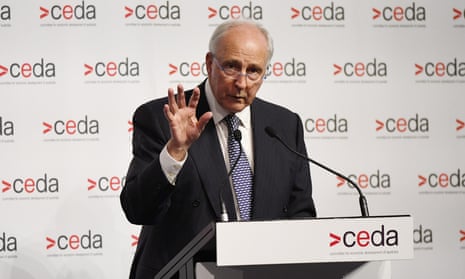Paul Keating has slammed Australia’s big business lobby groups for being obsessed with tax cuts and lacking the imagination to prevent the economy slipping backwards.
He has also taken aim at “conservative Australia”, saying it doesn’t understand that economic growth needs to be about “inclusion and justice” so everyone shares in the spoils of rising national income.
“We can see in America today what the loss of these balances means, watching the extremes of income and wealth rip at the fabric of American society,” Keating said.
In a forward-looking speech about the unique problems facing Australia, Keating told the annual dinner for the Committee for Economic Development of Australia on Tuesday that the country’s political and business leaders were failing voters.
He said they were failing to keep up with the changes wrought by globalisation, and the economy was slipping backwards as a consequence.
He criticised the prevailing nostalgia for the reform period of the 1980s and 1990s, saying it would not help Australia get through its current struggles.
He said globalisation and digitisation presented huge opportunities for Australia but the country needed to grasp their explosive potential.
He said business and political leaders needed to realise that the use of big data and artificial intelligence, if harnessed properly, promised to unleash a wave of productivity if applied to health delivery, education, road and transport systems, and the general operability of cities.
“These are the reform horizons we should be concentrating on, and not the dross handed down from the Business Council or the Financial Review – with the holy grail simply arriving with a company tax cut,” he said.
“Or whinging from the Australian Chamber of Commerce and Industry ... about penalty rates, when the reality of static wages growth stares us in the face.”
Keating also warned that the question of inclusive growth would “loom larger” in coming decades thanks to the continuing impacts of globalisation and technological disruption.
He said Australia must pay special attention to the needs of the less well-off as the pace of technological change quickens, because labour markets will continue to change quickly in the face of international competition.
“Large percentages of the population have been able to enjoy the benefits of trade and open competition, while others have suffered the brunt of the concomitant adjustments,” he said.
“This effect, these trends, are likely to amplify themselves as the network economy moves large chunks of commerce into automation under the strategem of artificial intelligence.
“The productivity surges with losses in employment have to mean that management of the economy has to focus heavily on inclusion. Large bodies of people cannot be left out or be left behind.”
Keating also defended his economic legacy in the face of criticism from people such as Sally McManus, the Australian Council of Trade Unions secretary, who says the Hawke and Keating era ushered in the age of neoliberalism.
Keating said “the Hawke-Keating changes, while market-oriented, differentiated themselves from neoliberalism and the plain reactionism of the Howards of this world by the commitment to inclusion”.
“The government at the time was committed to market reforms, but uppermost in its mind were the economic and social imperatives of inclusion and justice,” he said.
“We can see in America today what the loss of these balances means, watching the extremes of income and wealth rip at the fabric of American society.
“And we can see, now time has passed, how superior Australia’s model under Labor has been to that of the United States, or for that matter, most comparable industrial countries.
“This question of inclusive growth remains large and will loom larger because of the continuing impacts of globalisation and technological disruption.”

Comments (…)
Sign in or create your Guardian account to join the discussion